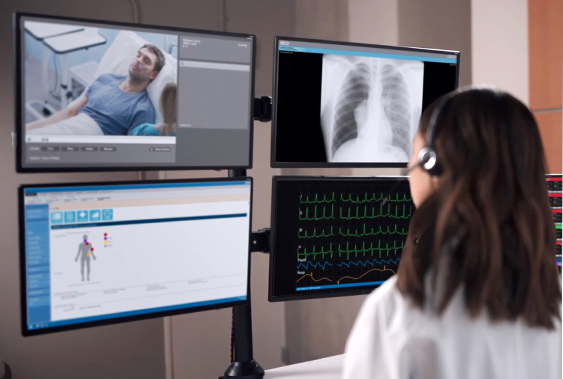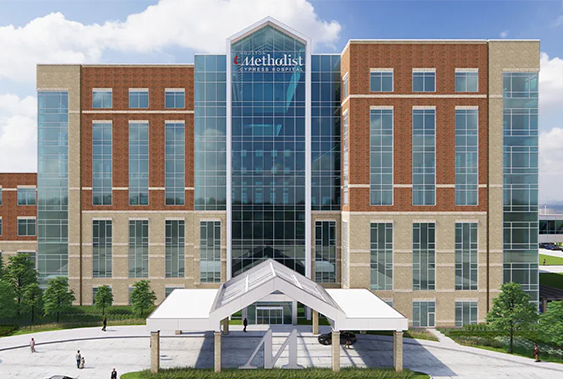An Eye on Innovation – Q&A with Roberta Schwartz.
As one of Newsweek’s 10 smartest hospitals in the world, Houston Methodist is committed to bringing the health care technology of tomorrow to life today. For more than 100 years, we’ve been the home to numerous groundbreaking innovations, including one of the first atomic medicine labs in the U.S. and Dr. Michael DeBakey’s transformative advances in cardiovascular surgery.
Since November 2018, HM’s Center for Innovation has continued that innovative spirit, promoting transformational growth through the adoption of cutting-edge technology. Leading this effort is Roberta Schwartz, executive vice president and chief innovation officer. We recently sat down with Roberta to learn more about the innovation efforts at HM.
Why is innovation so important at Houston Methodist?

Innovation is not just important for Houston Methodist, it’s critical for the entire health care industry. While other industries have recently experienced significant technical advances, health care hasn’t followed suit. Our industry is behind the times. We need to innovate, change and grow before disruptors and disruptions have a negative impact on our clinical outcomes.
We’re among the leaders in health care innovation because we understand the need, we recognize the opportunity and we have a vested interest in the impact. We’re fostering a culture of innovation throughout our organization and looking for opportunities to use new technologies to deliver unparalleled safety, quality, service and innovation.
We were smart enough to begin our innovation journey several years ago and now we’re seeing the fruits of that labor through enhancements in the patient experience and improved efficiencies for our clinicians and staff.
What impact has the Center for Innovation had on Houston Methodist and health care?
Even before the pandemic, telemedicine tools were being developed and deployed at Houston Methodist, but these really started to escalate in March 2020. Ultimately, more than 800 providers in 19 service lines utilized telemedicine services for outpatient services during the pandemic. Other tools, like iPads in patient rooms, video-enabled physician rounds and virtual ICUs grew during the pandemic and are still making real differences today.
Meanwhile, CareSense, or the Care Pathways program, helps patients before and after treatments through appropriately timed texts and emails based on their conditions, what to expect and important next steps. And again, the results are phenomenal, with high patient and clinician satisfaction, improved patient engagement and a 50% reduction in readmissions.
Our patients now can make appointments, register and check-in online. They can text with registrars and physicians. Many of our phone lines have automated “bot” technologies to aid in transfers.

And, we are using “big data” to look at quality initiatives and how we can learn from 20+ years of Medicare data and other data sets to inform us about patient risks, help us improve our medical coding and identify additional community support where patients can benefit.
What innovation trends do you see at Houston Methodist and in health care over the next 5 to 10 years?
Remote monitoring and biosensors are quickly becoming a big trend for health care. Small wearable devices can monitor a broad array of vitals and patient data, including temperature, heart and respiratory rate, body position and activity levels. Other remote tools are being developed to enable at-home lab testing. These could be used for recently discharged patients to alleviate the need to return to their doctor’s office.
We’re already using ambient listening tools, like Alexa, in patient rooms. This functionality will only grow as we create integration tools to help patients communicate with care givers and help clinicians use their voice to work in Epic.
We’re also piloting other ambient intelligence technology programs in our ORs, which can capture vast amounts of data and provide reports on clinical activities, like start and stop times or certain medication administrations, as well as the use of various supplies during procedures. The potential for these tools is growing and will change the way we work and treat patients.
What innovations are going into our smart hospital in Cypress to make it unique?
The real difference with Cypress will be behind the walls. Many of the innovations that we have today will also be available at our other hospitals. But with Cypress, we’ll be able to test newer technologies almost immediately. And if they’re appropriate, we’ll find ways to make them available to the rest of the system.
We’re building Cypress, from the ground up, with an eye toward technologies we don’t even know about yet. When it opens, our ninth hospital should have the infrastructure to support nearly any innovation that arises. Some other differences may include the use of technology to eliminate waiting rooms in clinics or get patients into surgical areas without any on-site registration processes.
What is the Ion Technology Hub and how will this shape our ability to further innovate at Houston Methodist?

The Tech Hub at the Ion will mimic our tech hub at HMH. It will be a central point where companies at the Ion can access an HMH space easily. It will provide opportunities to collaborate, create, develop and test new technologies in a simulated health care environment.
Ion will also be used for informational and educational programming, as well as a venue to network and mentor others. We’re also looking to host open houses that allow Houstonians to learn about health care innovations.
Regarding our innovation efforts, what are you most proud of?
I’m most proud that, as an organization, we never settle. We’re always looking to be better, to grow and improve. Health care is a human-led industry, so it’s hard to be perfect. But I love the fact that the minute we solve one problem, we don’t just go on to the next challenge. We try to find solutions that are better and better and better.
We have also generated a lot of excitement throughout Houston Methodist. People throughout our organization are asking, “How can we do this differently?” We’ve got 29,000 innovators and the power of that ingenuity is amazing.
